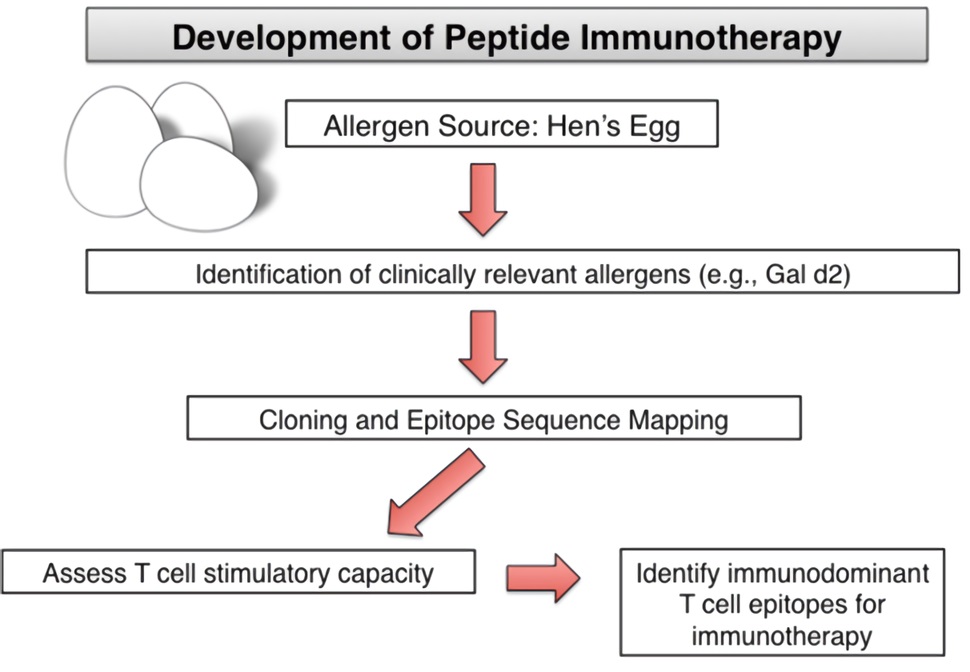Egg Allergy Vaccine Design Service
Egg allergy, as one of the most common food allergies encountered in pediatric practice, is also an indicator of the future development of asthma and sensitization to aeroallergens. Creative Biolabs now provides vaccine development services for egg allergy according to customer's detailed requirements.
Introduction of Egg Allergy

Egg allergy represents one of the most common food allergies encountered in pediatric practice, with an estimated prevalence of 0.5 to 2% in infants and young children. Egg allergy is a particularly debilitating allergy, which has an important impact on the quality of life. Patients and family have to avoid many types of foods and live with the fear of accidental reactions.
The hen’s egg contains multiple allergenic proteins including ovomucoid (Gal d1), ovalbumin (Gal d2), ovotransferrin, and lysozyme. Gal d2 is one of the major hen egg allergens associated with egg allergy. Gal d2 is described as a monomeric phosphoglycoprotein with a molecular mass of approximately 45 kDa. It represents 54% of the total protein content of hen egg white.
Peptide-Based Vaccines for Egg Allergy
Peptide-based food allergy vaccines contain short, synthetic, allergen-derived peptides that correspond to the T cell epitopes from the food allergen. T cell epitopes are peptide sequences that are introduced to antigen presenting cells, which are capable of inducing immunologic tolerance. The peptide fragments (approximately 8-16 amino acids in length) are smaller than the whole allergen and therefore are too short to cross-link IgE on mast cells and basophils. Since the risk of IgE cross-linking is low, they reduce the risk of immediate hypersensitivity reactions and are thought to be safer and possibly more effective in inducing tolerance in allergic individuals when compared to the use of whole allergens for immunotherapy.
To prepare peptide vaccine, all potential T cell epitopes are determined by cloning of allergen-specific T cell lines from a large population of patients. Once determined, the exact epitope sequence is mapped. To identify dominant T cell epitopes, they are evaluated for T cell stimulatory capacity. The most immunogenic is considered to be the subject of immunotherapy (Figure 2).

Fig. 2 Identification of T cell epitopes in peptide immunotherapy. (Cook. 2018)
Our Services for Egg-Allergy Vaccine
Creative Biolabs has a variety of mature and comprehensive platforms and technologies for vaccine development, and we are committed to providing the best solutions and customized protocols for vaccine design and development for egg allergy. We offer the following related services:
- Prediction and identification of T cell epitopes
- Construction of vaccine vector
- Evaluation and data analysis of the immune effects of candidate vaccine
- Provide specialized vaccine development designs and solutions based on customer needs
Creative Biolabs is a world leader in the field of vaccine development and has been dedicated to vaccine design services for many years. We have experienced experts and advanced platforms that are able to provide excellent vaccine design and development services for allergic disease. If you need service with this, please contact us for more details.
Reference
- Cook Q S and Burks A W. Peptide and Recombinant Allergen Vaccines for Food Allergy. Clin Rev Allergy Immunol. 2018. 55(2): 162-171.
All of our products can only be used for research purposes. These vaccine ingredients CANNOT be used directly on humans or animals.


